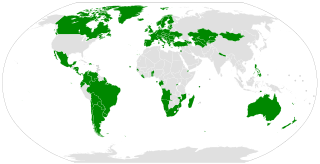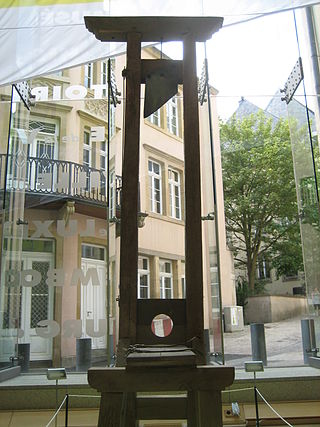Related Research Articles

The Second Optional Protocol to the International Covenant on Civil and Political Rights, aiming at the abolition of the death penalty, is a subsidiary agreement to the International Covenant on Civil and Political Rights. It was created on 15 December 1989 and entered into force on 11 July 1991. As of December 2024, the Optional Protocol has 92 state parties. The most recent country to ratify was Zambia, on 19 December 2024.
Capital punishment is no longer applied in San Marino: the last execution was carried out in 1468 or in 1667, by hanging.

Capital punishment in Luxembourg was abolished for all crimes in 1979.
Capital punishment in Chile is legally sanctioned, albeit with significant limitations. Since its abolition for civilian offenses in 2001, its application has been restricted to military personnel convicted of war crimes and crimes against humanity committed during wartime. This places Chile among the seven countries globally that have abolished capital punishment solely for ordinary crimes.
Capital punishment is a legal penalty in El Salvador. It was abolished in 1983 by Article 27 of the constitution, with an exception allowed for crimes committed under military law during a state of international war. Because of this, El Salvador is one of seven countries considered "Abolitionist for Ordinary Crimes," along with Brazil, Burkina Faso, Chile, Guatemala, Israel, and Peru. El Salvador last carried out an execution in 1973.
Capital punishment is a legal penalty in Grenada. Despite its legality, there have been no executions since 1978. Grenada is considered "abolitionist in practice", and is currently the only country in the Americas in this category. There is currently one person on death row in Grenada, as of August 30, 2021. During its United Nations Universal Periodic Review on January 27, 2020, Grenada informed the UN that it was a de facto abolitionist state with a de facto moratorium in effect since 1978, and that it would not carry out any executions. Abolishing capital punishment in law was part of one of the amendments during the failed 2016 Grenadian constitutional referendum. Grenada voted against the United Nations moratorium on the death penalty in 2007, 2008, 2010, 2012, 2014, 2016, 2018, and most recently, in 2020. Grenada is not a signatory to the Second Optional Protocol to the International Covenant on Civil and Political Rights.
Capital punishment has been abolished in Bolivia and is no longer a lawful punishment in the country. It was abolished for ordinary crimes in 1997, and for all crimes in 2009. Bolivia's last execution was of Melquiades Suxo on 30 August 1973.
Capital punishment has been abolished in Paraguay. It was abolished in the year 1992 by the constitution. The last execution was carried out in Paraguay in 1928.
Capital punishment is a legal penalty in Liberia. However, Liberia is classified as a state that is "abolitionist in practice." Liberia last executed in 2000.
Capital punishment was abolished in Burundi on 24 April 2009. Burundi is not a state party to the Second Optional Protocol to the International Covenant on Civil and Political Rights. The last legal execution in Burundi took place in 1997.
Capital punishment was abolished in the Republic of the Congo in 2015. The country carried out its last execution in 1982. Before the abolition of the death penalty, the Republic of the Congo was classified as "Abolitionist in Practice." The Republic of the Congo is not a state party to the Second Optional Protocol to the International Covenant on Civil and Political Rights.
Capital punishment was abolished in Djibouti in 1995. There have been no executions in Djibouti since independence from France on 27 June 1977. The country acceded to the Second Optional Protocol to the International Covenant on Civil and Political Rights on 5 November 2002.
Capital punishment in Gabon was officially abolished for all crimes in 2010. Gabon's last execution took place in 1985. Prior to abolition, Gabon was classified as de facto abolitionist, or "abolitionist in practice," due to the length of time since their last execution.
Capital punishment was abolished in Guinea. The civilian death penalty was abolished in 2016. It was abolished under military law in 2017. Guinea carried out its last execution in 2001. Prior to its abolition for ordinary crimes in 2016, Guinea was classified as retentionist.
Capital punishment was abolished in Madagascar in 2015. The last execution in Madagascar was carried out in 1958. Prior to de jure abolition, Madagascar was classified as "Abolitionist in Practice."
Capital punishment was abolished in Mauritius in 1995, following the adoption of the Abolition of Death Penalty Act 1995. The last execution was carried out in Mauritius in 1987.
Capital punishment was abolished in Mozambique in 1990. The last execution took place in the country in 1986.
Capital punishment was abolished in Namibia in 1990. The last execution was carried out in 1988, under the rule of South Africa.
Capital punishment was abolished in Senegal in 2004. The country carried out its last execution in 1967.
Capital punishment was abolished in Togo in 2009. The country carried out its last execution in 1978. Prior to the death penalty's de jure abolition, Togo was classified as "Abolitionist in Practice."
References
- ↑ "Nito Alves 1945-1977". 18 May 2005. Archived from the original on 2014-12-10.
- ↑ "12. Second Optional Protocol to the International Covenant on Civil and Political Rights, aiming at the abolition of the death penalty". United Nations Treaty Collection. Archived from the original on January 4, 2014. Retrieved July 7, 2022.